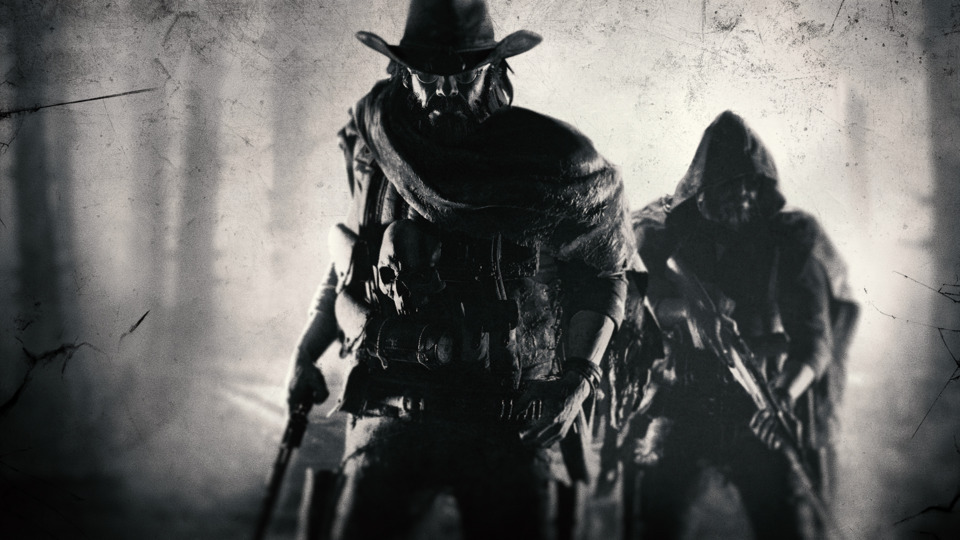
After all of these years of playing video games, I finally managed to hit 1,000 hours on a game. Now for some, that may seem like nothing as I know there are those who have 10,000 or more hours in games. But do keep in mind that I have been playing a wide variety of games over the past five years for blog writing and I never leave a game running on my desktop unattended for longer than 15 minutes (outside of Cookie Clicker), so squeezing in 1,000 hours of something in the cracks is impressive for me. So with that said, I present to you my 1,000 hour game: Hunt: Showdown.
I first tried out this game in alpha back in January/February time, and I picked up the game on day one of its early access release on February 22nd, 2018. From there, I can only speak on memory, which may or may not be accurate. From what I remember, I put in around thirty hours into the game right when it released, dropped off for awhile, redownloaded the game when it hit 1.0 in August of 2019, put in around another thirty hours off-and-on until around early 2020 when I decided to fully commit, then consistently played the game until then. During that time, I put out two blogs on the game: one in 2018 talking about my time with the alpha, and one right before the 1.0 release talking about how the game builds tension. I also put out a blog in May of 2020 talking about the games I played during quarantine, and one part of that blog includes Hunt: Showdown.
I have always loved the game since the moment I started playing, but I dropped off of it for a variety of reasons. It’s a mix of not being consistent with competitive multiplayer games at that time, being consistent with other games where my friends were at, and not knowing where a consistent game like this could fit into a schedule of playing other games. My next two highest hour count games are Counter Strike: Global Offensive at 389 hours and Payday 2 at 328 hours, but the bulk of my CS:GO hours were put in before I started writing and I managed to put in a bunch of Payday 2 hours because all of my friends own the game and there is a ton of content to play around with.
With both games, however, I eventually tired out, and that plus having a better grasp over playing all the other games for writing purposes meant I had a consistent game-shaped hole to fill in. Leading up to early 2020, me and my friends were bouncing around from multiplayer game to multiplayer game, but not really finding anything that stuck. PlayerUnknown’s Battlegrounds was pretty close, and we even tried going back through some of our older games like Payday 2, Overwatch and CS:GO, but nothing ever really worked out. I grew tired of the moving and all the times I would throw away my skills of one game so I can build up my skills in another, so I decided at this point to settle down on one game. I’m super into RPG mechanics in multiplayer shooters like in Call of Duty, but Call of Duty cycles every year which I’m not a fan of. While Hunt: Showdown has a bit of these leveling mechanics, I wouldn’t really say this game checks off that box. And yet, I decided to go back to Hunt, and the sheer amount of fun I’ve had made this game stick for me.
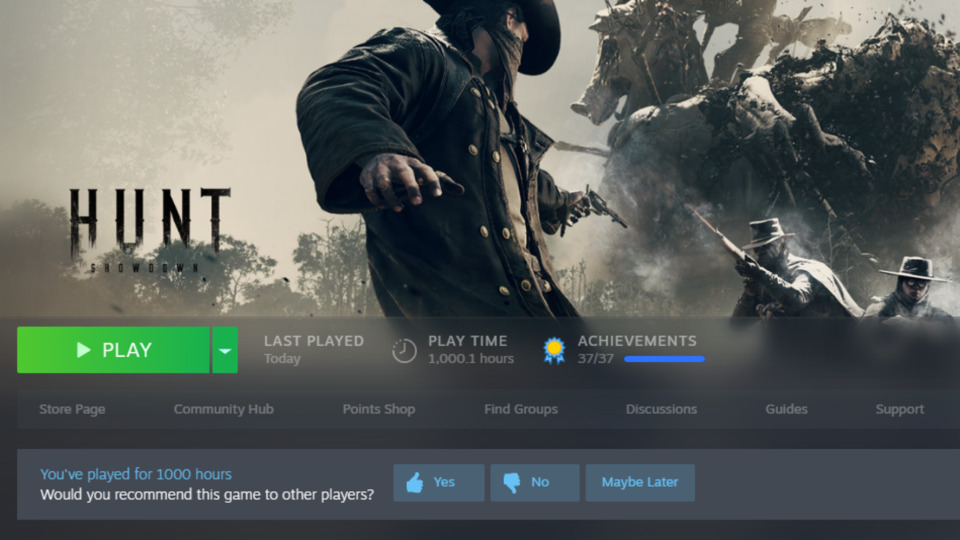
From there, things have been getting better. I got a bunch of friends to get into the game, and while some faded away from this game, others have stuck to it just like me. At around the time I started playing, the developers started to go heavy into events and updates (I actually hit the 1,000 hour mark during their Traitor’s Moon event), and they have been putting out some pretty significant content additions such as a new map, a new boss, new weapons, new skins, new abilities, and so forth. The game has consistently grown in population, and I can get into full quickplay matches, which wasn’t always the case.
While it has grown in popularity, it is still a niche game that only really resides on PC (there’s console versions, but I heard playing there isn’t that great). So, for those who don’t know, I’ll explain what this game’s about. Explaining everything is going to take some time though, so I’ll mark the beginning and end of this explanation.
Beginning of long explanation of this game
Hunt: Showdown is a PvPvE first-person multiplayer shooter set in a late 1800s Louisiana. The game takes place on battle royale-esque maps (a large area filled with a bunch of smaller named areas), but the map doesn’t shrink in the sense that being outside of the playable area will hurt you. That is about where the battle royale ties end (despite some initial coverage of the game labeling this a battle royale game). Before entering a game, players must purchase a hunter from the roster (which are generated characters and can be refreshed after each match), and each hunter can be equipped with two weapons, tools, and consumables. Players can keep whatever items the hunter comes with, or they can swap out items and purchase whatever they want from the shop using the game’s in-game currency (or go into the match with nothing, if they so desire).
Up-to twelve players are in each match, ranging from groups of 1-3 (the trios are segmented off, so it’s usually solo and duo matches or trio matches). They start the match at the edges of the map. The first part of the match is to go to the named locations within the map and pick up clues. They can find these clues using a mechanic called ‘dark sight,’ which can be used at any time and will blacken your vision but will show clues in a bluish glow at long distances. Throughout the map, players will encounter NPC enemies like basic zombies, stronger zombies, an enemy that explodes into a fiery ball when stabbed, an enemy that will direct a swarm of bees at players, and so on, and it is up to players on whether or not they want to kill them or avoid them. The world is also filled with what I call ‘audio queues’ such as a murder of crows, a kennel of dogs, half-dead horses, glass on the ground, and so on that will make loud noises when interacted with.
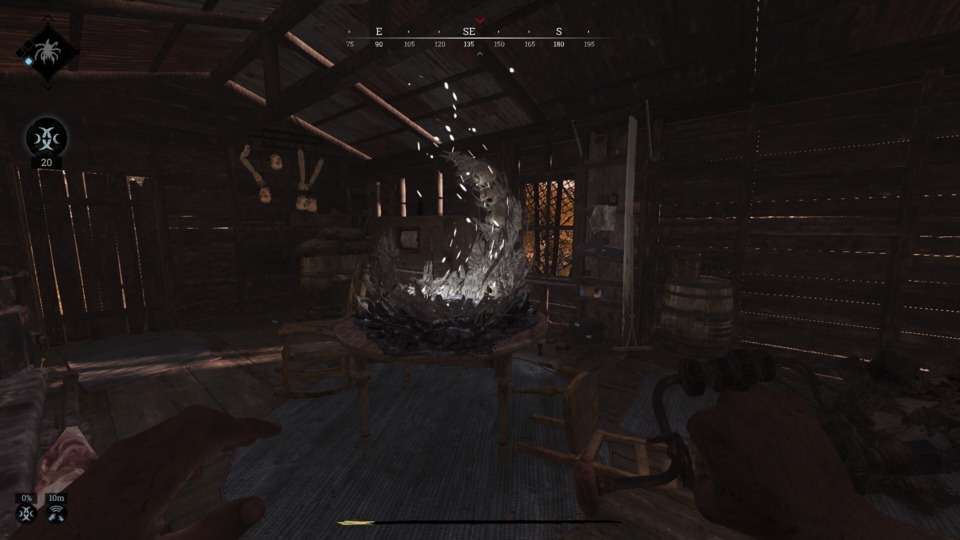
Once a team has picked up three clues (or if they happen upon the boss incidentally), the game will give them the location of the boss (each match can either have one or two bosses). Once a team defeats the boss, they have to banish it. A banish takes a few minutes to complete, and starting a banish will show the location of the banishing to all other players in the match. Once the boss is finished banishing, it will drop two bounty tokens. When a bounty token is picked up, it will give the player five seconds of enhanced dark sight, which will allow them to see the silhouettes of players through walls within a certain range. Bounty carriers, however, will show up as a little lightning bolt on other player’s maps, and lightning strikes can be seen constantly hitting the bounty carrier in dark sight, showing their general location at all times.
During this time, players will most likely fight each other. If a player dies, they can be revived by a partner (though they will permanently lose a chunk of their health, and there are only a few ways to get health back). If a team dies, then it’s game over for them.
The goal of bounty carriers is to extract at one-of-three extraction points found at random points on the edges of the map. The goal of the other players is to kill the bounty carriers (and anyone else standing in their way) and become the ones to extract with the bounty. At any point in the game, players are allowed to leave the match through these extraction points regardless of bounty.
After the match ends, players earn what is called ‘bloodline xp.’ This is a permanent form of experience that will unlock new items to purchase in the shop. If the player survives, they will also earn character xp, which is experience only applied to their used hunter. Leveling up a hunter will give them trait points, which can be spent on recovering permanently lost health chunks or buying traits such as better stamina, reduced weapon sway, the ability to fan (fast-fire) revolvers, and so on. If a character dies, all of their experience, traits, and items are lost (weapons can be picked up off of dead players in-game by the way), but the bloodline xp remains. From there, players will need to buy a new hunter and new items to keep playing.
End of long explanation
So, what got me to stick with this game for so long? I guess I’ll start with why I initially stuck with it. For starters, when it comes to games or movies, I’m usually more attracted to more unique experiences. I’ve had enough of the Call of Duty experience to know what the next game will be like, so a unique experience like this is fun because it’s new. Also in that same vein, I’m not a fan of the idea of dropping the current game as soon as the next on releases as I don’t want to reset my progress after every game release. I know that Call of Duty has somewhat fixed that problem with Warzone, but I prefer the traditional multiplayer experience which doesn’t quite have that, and Hunt seems to be a one-off game that I can keep my progress in without worrying about any Hunt: Showdown 2.
So why not just play Warzone? That leads to another reason of why I stuck with Hunt initially (any why I still like it now), and that’s its time-to-kill or TTK. What eventually got me to hop off the battle royale train while it was (and I guess it still kind of is) full steam ahead is the TTK, as just about every battle royale game has some sort of armor system that I believe ultimately screws around with the time-to-kill. I’m not a big fan of high TTK, and Hunt’s TTK is super low. Most of the weapons range from single-shot to semi-auto firearms due to its late 19th century setting, so where they lack in rounds-per-minute they make up for in power. Even the weakest pistol can one-hit headshot, and there is no armor in the game that can change around people’s health/damage resistance outside of a few character traits for explosive, elemental, or melee damage. Sure, a low TTK can lead to frustrating moments, but I have found greater frustrations in a higher TTK, and I have learned over time how to avoid the low TTK frustrations of Hunt with smarter play.
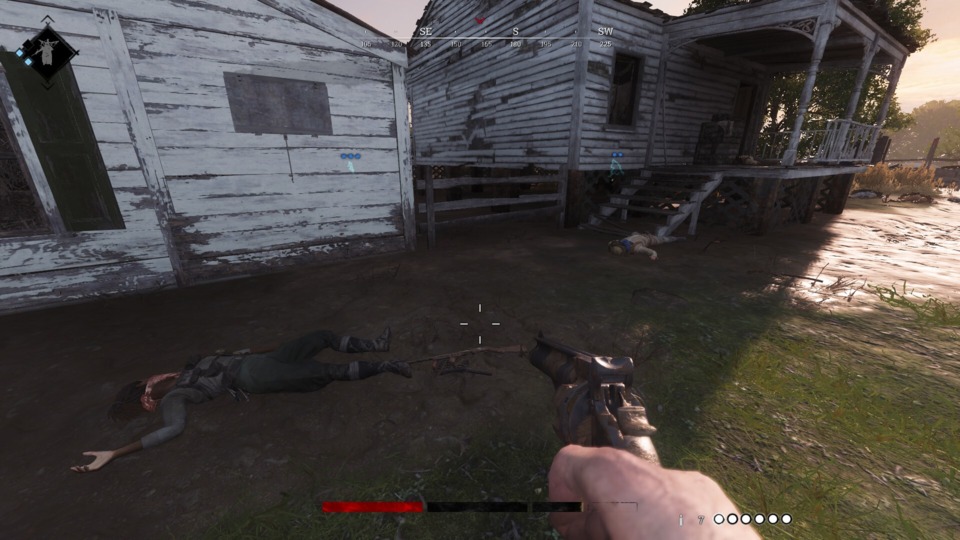
As I played the game more and more, I started to appreciate all of the other elements of this game. When thinking about what makes this game great in my opinion compared to other multiplayer shooters, one of the first things that comes to mind is audio. Hunt: Showdown has some of the best 3D audio in any multiplayer shooter. With the audio in this game, I can judge weapon type, distance, footsteps, ground type (what type of ground a person’s walking on), footstep pattern, direction, different levels of aggression among NPCs, and so much more. The game even has a feature in the menus in which you can choose any gun and see (or rather hear) what it sounds like at different distances. Audio plays such a major role in this game, and the amount of information I’m able to gather through every little bit of noise makes me equally impressed of myself and the game.
With how important audio in this game is, it’s not surprising that a big element of this game is stealth. The maps are full of audio queues/traps that set off noise when you get too close to them. Even NPC enemies follow these same rules and can be quite loud when aggravated. As a result, I and the others who play with me find that stealthily and tactically approaching enemy encounters is the best way to go. Yes, people can play aggressive and use shotguns (though I and others tend to frown upon this style of play), but they too need to be smart about their battles. What I find interesting about this is how tactical and stealth play is often associated with modern military settings, so having this style of play using revolvers and bolt-action rifles is rather unique.
The tactics aren’t for nothing, however, as the game’s semi-permadeath system means that there are stakes put into each match. Every hunt has a time and/or money investment into it, and losing a character with a lot put into them means losing an investment. By this point, the stakes don’t affect as much as they used to, but I remember this being a really big deal for me for most of my time with this game because I wanted to build up characters with specific traits so I could make specific builds with the few weapons I was good with. I remember budgeting when funds were low and spending extravagantly when they were high. Nowadays I can do fine with most weapons (and there is another reason why I don’t mind the stakes as much which I’ll touch on in a bit), but having that investment put into each match was and still kind of is exhilarating.
Another aspect of Hunt that I love is its setting, as I think it has one of the most unique and cool settings out of any multiplayer shooter. It essentially combines Western bounty hunters, monster horror, and a Louisiana setting into one stew. Beyond that, however, is a lot of lore that builds up various characters, events, and history. More than just a cool setting, it’s a fleshed out one that I believe permeates into the gameplay itself.
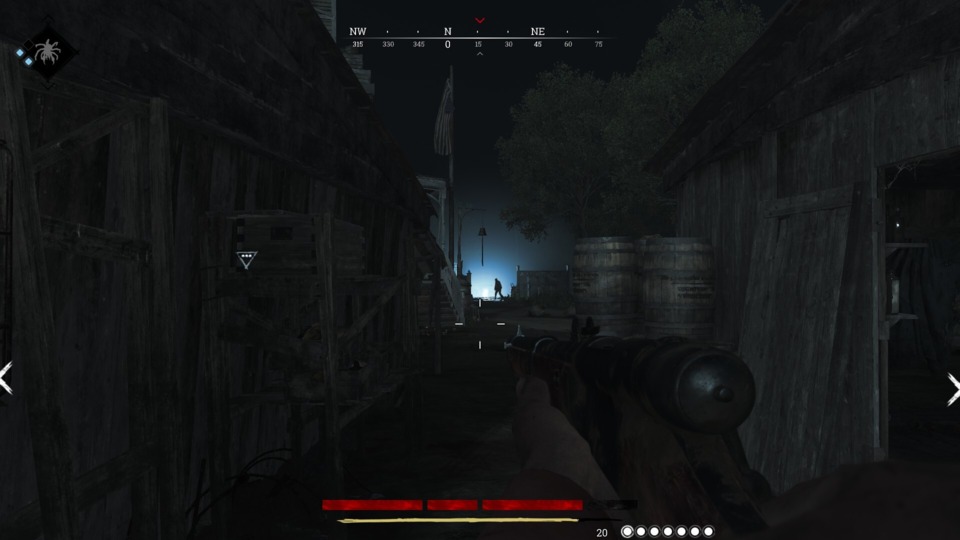
The main way this world permeates into the gameplay are with the maps themselves. While each map is similar in size, amount of locations, amount of supply points, and so on, they each have different dynamics going for them. Stillwater Bayou is more swampy while Desalle is more mountainous and Lawson Delta is in between the two. Each location offers different strategies on how to attack or defend them, whether it be hiding in a cornfield next to Stillwater Bend or sniping from the tower of Healing-Waters Church. Throw in random weather conditions like fog or night time, and it could even result in certain loadouts becoming detrimental, like packing a sniper rifle and having to defend the underground lair that is Pitching Crematorium. The areas between locations include paths, thick wooded areas, mountains, water, flat lands, smaller buildings, and more. These maps are a lot of fun to fight in, and I hope to see more of them in the future considering how great their most recent map Desalle is.
Ultimately though, the coolest part for me about this game is how I’ve combined all of these things together in such a way that I actually feel like a bounty hunter. I know, it sounds cheesy as hell and like something a journalist would say, but the way I’m able to track and stalk enemies through audio, stealth, and knowledge of the maps makes me feel like I’m tracking down a bounty through familiar lands, which I guess I am. I know the maps inside and out, I am able to judge threats based on audio and player actions, I know how to handle every type of NPC enemy and boss, and so on. Learning all of the intricacies and truly inhabiting the role of the character can be said for every game, but I think becoming a cowboy monster hunting bounty hunter is a pretty cool role to fill.
While it’s been a lot of fun to see the game develop and its population grow, it also means being exposed to the game’s flaws for more time than others. Hunt: Showdown is not a perfect. No game is. And while I would consider myself a bit of an apologist with this game and can let some smaller things slide, there are flaws I have noticed that are inexcusable.
The big flaws for a lot of people have to do with the technical side of this game. The servers aren’t great, Cry Engine-while it certainly looks pretty and leads to a fantastic atmosphere-makes my computer want to cry, and there are small bugs and technical flaws found here-and-there. I never really experienced any major server issues and a lot of the bugs I’ve come across are usually too small to care about, but performance is a pretty big issue for me. My PC is getting a bit older (I’m running a GTX 1080, 16 GB of RAM, and an Intel Core i7-6700 CPU), but even at the lowest settings I’m lucky to keep 60 FPS. I’m still able to have a fun time regardless, but sometimes I wonder how much better this game could run if it was developed on a different engine.
Another issue I’ve had with this game over time (which is one I alluded to earlier) is how the game is starting to feel a bit streamlined. I’m by no means saying the game is like Call of Duty now, but I do think the game is losing its edge a bit as a result of its increasing player counts. I’m personally fine with the game adding in the option between traditional shooter aiming and Hunt’s original aiming schemes, but stuff like adding in more semi-automatic guns and shotguns for increased aggressive play and easier forms of making money makes the game feel a little more casual. The other reason why I don’t mind the semi-permadeath systems anymore is because I make enough money to buy whatever I want whenever I want thanks to daily xp rewards, small money bags found on the ground, and so on. It’s a slight change and I still think Hunt is mostly at the same levels of difficulty and whatnot as before, but it is something to watch out for.
My last major complaint with this game has to do with their events. While their events aren’t anything special (either just Twitch drop campaigns or in-game events in which you earn points through destroying sigils spawned around the map, and those points unlock event skins), I still think they are a nice recent addition to the game. The developers have been trying to get a bit greedy with the last few events, however. This most recent event, for example, includes five event skins, but four of them are unlocked through getting event points and whatnot while the fifth skin has to be purchased using ‘blood bonds’ (which can either be earned slowly through playing the game or purchased), and the fee for that skin was extraordinarily high. They also gave four legendary hunters a slight event point boost, but all four hunters chosen are DLC purchases, and there was a big blood bond reward for completing three event-related tasks, but one of the tasks was to purchase a DLC legendary hunter. It’s ultimately all for skins that give no combat benefits or advantages, but it still feels scummy nonetheless.
One last point I’ll touch on before wrapping up is a question meant for any person with a lot of hours in one game: am I good? Honestly, I don’t know. Whenever I play with someone new and they talk about how they are going to suck at the game as a newcomer, I always tell something along the lines of this: nobody’s good at Hunt, they’re just less bad than others. I certainly know my way around the game better than others and I am “less bad” than newcomers, but to say I’m good at Hunt is like saying I’m good at blogging. Saying I’m “good” at either makes me feel like I’m at an endpoint in terms of learning and improving, but there is still so much room for learning, improvement, and change with both. Hunt is a game where even now I’m still learning, improving, and can never truly rest on my laurels, and that is another reason why I love this game so much.
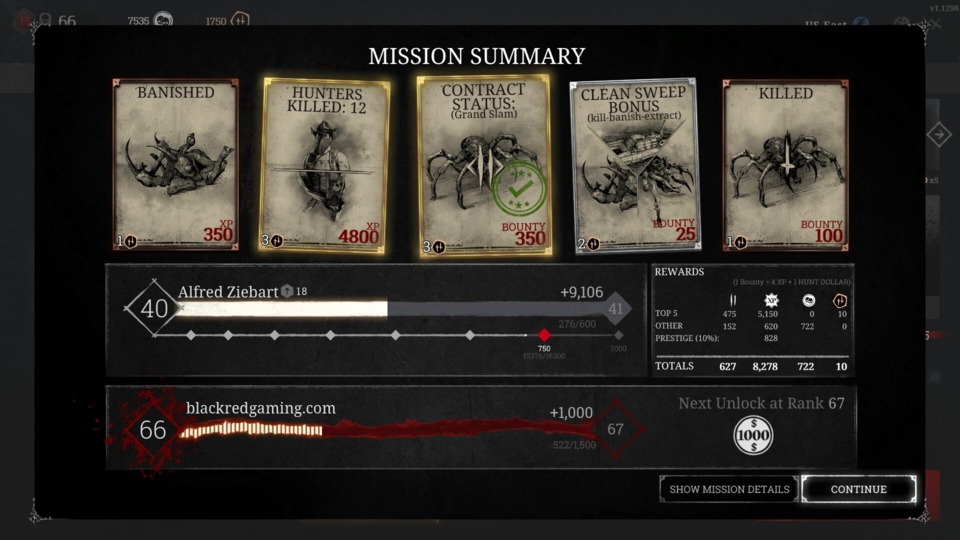
Interestingly enough, Hunt and Escape From Tarkov are starting to spawn more experiences like this, with even a big dog like Battlefield taking up the idea in Battlefield 2042. But even with other games taking up the idea, I’ll still stick with Hunt. Even at 1,000 hours in, I’m still having a lot of fun with the game. I don’t feel myself wearing out on the premise or getting frustrated with the experience. And besides, I’m this far in, so what’s the point in turning back? I’m excited for the future of Hunt, and I hope to see more people exposed to the game in the future.
Log in to comment